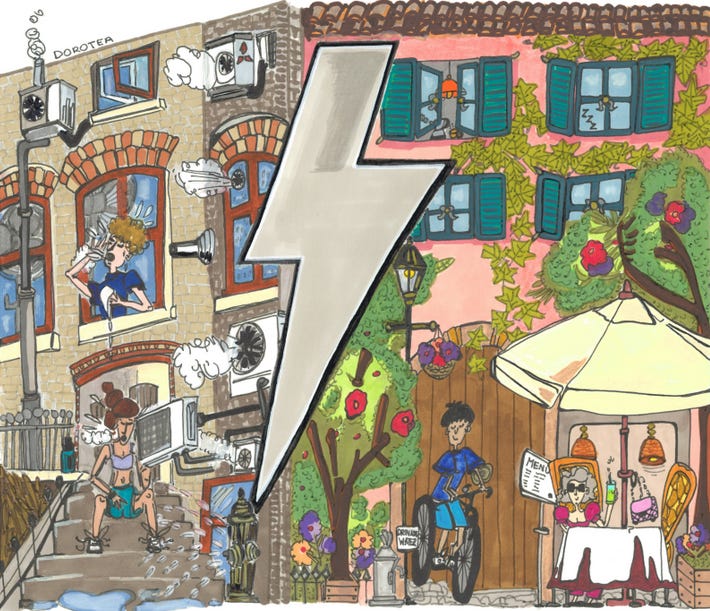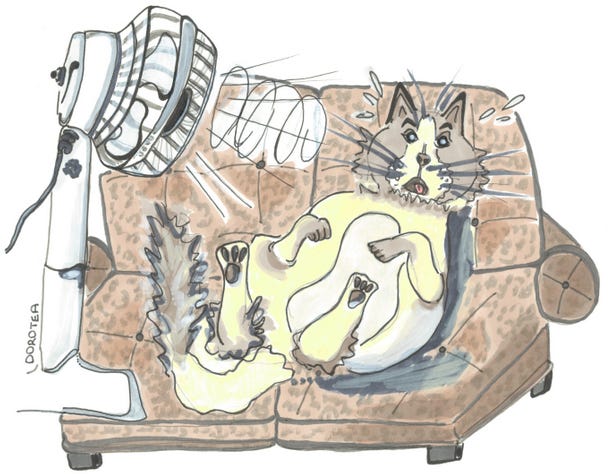AC<DC
Air conditioning is a poor substitute for district cooling.
The dog days of summer are giving way to languid late-August evenings. It’s time for Europeans to slowly return to the office and trade stories about all the stupid things we said when the heat was addling our brains.
Things like “why don’t we just install air conditioning everywhere?”
As European heatwaves become more frequent and intense, the aircon discourse has gathered pace. While much of it is driven by America brain,1 the idea of mass-installation of AC is now embraced by Marine Le Pen, who might well be France’s next president.
Apparently the most obvious argument against aircon – that it’s crass and American – is no longer enough to keep it at bay. So here is a reasoned case for why AC, if widely adopted, will change the fabric of our cities and societies for the worse.
Air conditioning is a consumption-based solution to a shared problem. Like other things in this category, it’s attractive on an individual level but harmful when adopted wholesale, bringing negative externalities and removing the political incentive to come up with a more effective common solution.
Consider the motor car. In a city where nobody else has one, it would be great: You’d get around more quickly, comfortably and safely than anyone else. But when everyone has one, we all spend hours stuck in gridlock and choking on pollution. Politicians don’t bother to deal with crime on public transport because it mainly affects poor people, and every spare bit of public space is given over to car storage. Cars, at scale, have ruined our cities.
Harmful technologies have a tendency to become inevitable. If enough people adopt air conditioning, living without it will become unthinkable – partly because of status games but also because AC literally makes cities hotter, compounding the public problem that it mitigates in private.
The laws of physics determine that ‘cold’ is merely the absence of heat. You cannot create cool air, only displace the heat – in the case of air conditioners, into public space. At scale this causes a noticeable increase in outdoor temperatures, leading to urban ‘heat bubbles’ whereby merely uncomfortable heat becomes unbearable.
For people who can’t afford air conditioning, this is catastrophic. But it’s also bad for the rest of us, forcing us into air conditioned bubbles and taking away our liberty to move freely around our cities.
Only snowflakes melt
I’m aware that everything is now linked to the culture war and air conditioning is right-coded, so here’s a message to my based brethren: A man who clings to AC is a snowflake. If Il Gattopardo could survive 1860s Sicily in a three-piece wool suit, you can tolerate 2020s northern Europe in your shorts and T-shirt, you absolute flannel.
The human body is an adaptable thing, if not overridden by our minds. When faced with discomfort our first instinct is to mitigate it; if we have AC, we’ll use it. But if you don’t have that option your body adapts, you maybe change your daily rhythms slightly, and you get on with your life.
If too much comfort causes you to become soft, you become a prisoner. You can’t go outside except in an air-conditioned car, where you’ll be stuck in traffic with the other snowflakes. Your world shrinks. I felt these shackles living in Dubai, where the heat is so extreme that AC is actually necessary for much of the year. It’s not a dependency that any society should enter into willingly.
What’s more, you’re making it worse for the rest of us. Your air-conditioned cars make the city hotter and more crowded – and kill more people than the heat does.2 Your buildings pump heat into the street. By retreating into your competing private spaces, you remove the political impetus to better adapt our shared public space to the changing climate.
Enter district cooling
This isn’t to diminish the dangers of excess heat, which can be severe. Hospitals and care homes should be air conditioned to protect the vulnerable. But as we learned during Covid, protections for the vulnerable shouldn’t necessarily be enforced on those who don’t need them. Better solutions exist.
Europe is not Dubai; the uncomfortable temperatures we experience for a few weeks a year are entirely manageable by means other than AC. Other parts of the world, even southern parts of Europe, have dealt with higher temperatures since time immemorial. A newer technology is not always better than the thing it replaces.
Simple measures such as planting trees can cool a city by up to 2 degrees. Drinking fountains can help people regulate their body temperature, while larger water features and shading structures can provide a cooling effect over a large area. Sympathetic architecture such as outdoor shutters can make a big difference to indoor spaces.
In cities across Europe and beyond, mayors have been putting district cooling measures in place to great effect, cleverly deploying shaded areas, greenery, and cooling spaces for vulnerable people. Parisians can even cool off in the Seine, which has been cleaned to an acceptable standard for the first time in a century.
There is a risk that this progress will be lost. Europe’s rightward political drift is a necessary cultural corrective at the national level, but in cities it risks sacrificing all of these beneficial community-based initiatives at the altar of consumerism, which would have us all sitting miserably in individual air-conditioned bubbles.
Summertime, and the linen is easy
Once it becomes possible to live entirely in an AC bubble, the culture can change in surprising ways. In Dubai and Singapore, businesspeople wear heavy clothing throughout the year, partly to be comfortable under the aggressively cold AC and partly to signal that they can afford never to leave it. This in turn reinforces the dependency, since behaviours that would be possible while wearing linen or seersucker – taking a bus, or sitting outside – are unbearable in a heavy suit.
In Europe, natural heat creates a market for summer tailoring, which brings seasonal variation and joy as well as practicality. Business dress codes are relaxed in the summer months, so we can sit on elegant café terraces, sipping our little coffees in our natty linen jackets feeling superior to Americans. What self-respecting European would give that up?
A condition where the patient fails to distinguish between Europe and America, caused by chronic overexposure to American media and culture.
More than 100,000 children in London were admitted to hospital last year with breathing difficulties, many of them linked to diesel pollution. Electric cars aren’t much better.




Love to see you writing about this Sam. It is a subject near and dear to my heart. A few important elements to consider in addition: a city with additional green space and trees is not only cooler but has significantly more capacity to absorb water. As rains get more intense this will ability is key for lessening massive damage from flooding. Finding room for green space and trees in a packed city is difficult. We can't tear down buildings to out up a park. So what's the lowest value land in a city? On street parking. Cooling cities as you describe will require a massive reduction in in street parking and it will be a hell of a battle. We need a big investment in public transport and bike lanes (both of which move many more people per M2 than cars) to free up more space for these kind of interventions. The cities that do this well will flourish. The cities that don't will whither. And if we do succeed in the broad greening of our cities what will be the impact on the car industry? I can imagine they will fight these efforts tooth and nail.
Cool, well happy to have made the comment then. I like the sentiment of 'sympathetic urbanism'. That's a nice turn of phrase.